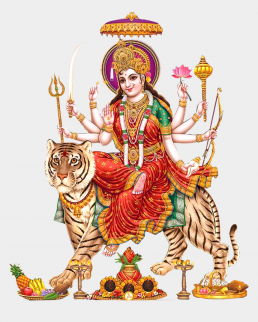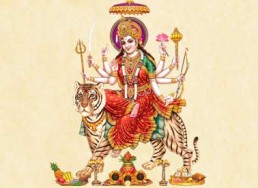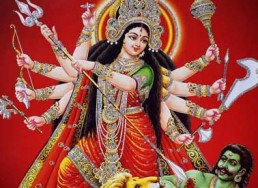Shakradaya Stuti
तस्मिन्दुरात्मनि सुरारिबले च देव्या ।
तां तुष्टुवुः प्रणतिनम्रशिरोधरंसा
वाग्भिः प्रहर्षपुलकोद्गमचारुदेहाः ॥१॥
ṭasmin-ḍurātmani Sura-āri-Bale Ca ḍevyā |
ṭām ṭussttuvuh Prannati-ṇamra-ṣirodharamsā
Vāgbhih Praharssa-Pulako[a-ū]dgama-Cāru-ḍehāh ||1||
निःशेषदेवगणशक्तिसमूहमूर्त्या ।
तामम्बिकामखिलदेवमहर्षिपूज्यां
भक्त्या नताः स्म विदधातु शुभानि सा नः ॥२॥
ṇihśessa-ḍeva-ġanna-ṣakti-Samūha-ṃūrtyā |
ṭām-āmbikām-ākhila-ḍeva-ṃaharssi-Pūjyām
Bhaktyā ṇatāh Sma Vidadhātu ṣubhāni Sā ṇah ||2||
ब्रह्मा हरस्च न हि वक्तुमलं बलं च ।
सा चण्डिकाखिलजगत्परिपालनाय
नाशाय चाशुभभयस्य मतिं करोतु ॥३॥
Brahmā ḥaras-Ca ṇa ḥi Vaktum-ālam Balam Ca |
Sā Cannddikā-[ā]khila-Jagat-Paripālanāya
ṇāśāya Ca-āśubha-Bhayasya ṃatim k͟harotu ||3||
पापात्मनां कृतधियां हृदयेषु बुद्धिः ।
श्रद्धा सतां कुलजनप्रभवस्य ल्ज्जा
तां त्वां नताः स्म परिपालय देवि विश्वम् ॥४॥
Pāpātmanām k͟hrtadhiyām ḥrdayessu Buddhih |
ṣraddhā Satām k͟hulajana-Prabhavasya l̤ajjā
ṭām ṭvām ṇatāh Sma Paripālaya ḍevi Viśvam ||4||
किञ्चातिवीर्यमसुरक्षयकारि भूरि ।
किं चाहवेषु चरितानि तवाति यानि
सर्वेषु देव्यसुरदेवगणादिकेषु ॥५॥
k͟hin.-Ca-āti-Vīryam-āsura-k͟hssaya-k͟hāri Bhūri |
k͟him Ca-āhavessu Caritāni ṭava-āti ẏāni
Sarvessu ḍevy-āsura-ḍeva-ġanna-[ā]adik-ĕssu ||5||
न ज्ञायसे हरिहरादिभिरप्यपारा ।
सर्वाश्रयाखिलमिदं जगदंशभूतम्_
अव्याकृता हि परमा प्रकृतिस्त्वमाद्या ॥६॥
ṇa Jnyāyase ḥari-ḥara-[ā]adibhir-āpy[i]-āpārā |
Sarva-[ā]aśraya-ākhilam-īdam Jagad-āmśa-Bhūtam_
āvyākrtā ḥi Paramā Prakrtis-ṭvam-āadyā ||6||
तृप्तिं प्रयाति सकलेषु मखेषु देवि ।
स्वाहासि वै पितृगणस्य च तृप्तिहेतुर्_
उच्चार्यसे त्वमत एव जनैः स्वधा च ॥७॥
ṭrptim Prayāti Sakalessu ṃakhessu ḍevi |
Svāhā-[ā]si Vai Pitr-ġannasya Ca ṭrptihetur_
ūccāryase ṭvam-āta ĕva Janaih Svadhā Ca ||7||
अभ्यस्यसे सुनियतेन्द्रियतत्त्वसारैः ।
मोक्षार्थिभिर्मुनिभिरस्तसमस्तदोषैर्_
विद्यासि सा भगवती परमा हि देवि ॥८॥
ābhyasyase Suniyate[a-ī]ndriya-ṭattva-Sāraih |
ṃokssa-ārthibhir-ṃunibhir-āsta-Samasta-ḍossair_
Vidyā-[ā]si Sā Bhagavatī Paramā ḥi ḍevi ||8||
उद्गीथरम्यपदपाठवतां च साम्नाम् ।
देवी त्रयी भगवती भवभावनाय
वार्ता च सर्वजगतां परमार्तिहन्त्री ॥९॥
ūdgītha-ṟamya-Pada-Pātthavatām Ca Sāmnām |
ḍevī ṭrayī Bhagavatī Bhava-Bhāvanāya
Vārtā Ca Sarva-Jagatām Parama-[ā]arti-ḥantrī ||9||
दुर्गासि दुर्गभवसागरनौरसङ्गा ।
श्रीः कैटभारिहृदयैककृताधिवासा
गौरि त्वमेव शशिमौलिकृतप्रतिष्ठा ॥१०॥
ḍurgāsi ḍurgabhavasāgaranaurasanggā |
ṣrīh k͟haittabha-āri-ḥrdayai[a-ĕ]ka-k͟hrta-ādhivāsā
ġauri ṭvam-ĕva ṣaśi-ṃauli-k͟hrta-Pratisstthā ||10||
बिम्बानुकारि कनकोत्तमकान्तिकान्तम् ।
अत्यद्भुतं प्रहृतमात्तरुषा तथापि
वक्त्रं विलोक्य सहसा महिषासुरेण ॥११॥
Bimba-ānukāri k͟hanako[a-ū]ttama-k͟hānti-k͟hāntam |
āty[i]-ādbhutam Prahrtam-āatta-ṟussā ṭathāpi
Vaktram Vilokya Sahasā ṃahissāsurenna ||11||
उद्यच्छशाङ्कसदृशच्छवि यन्न सद्यः ।
प्राणान् मुमोच महिषस्तदतीव चि्त्रं
कैर्जीव्यते हि कुपितान्तकदर्शनेन ॥१२॥
ūdyac[t]-[ṣ]chaśāngka-Sadrśac-chavi ẏan[t]-ṇa Sadyah |
Prānnān ṃumoca ṃahissas-ṭad-ātīva Citram
k͟hair-Jīvyate ḥi k͟hupita-āntaka-ḍarśanena ||12||
सद्यो विनाशयसि कोपवती कुलानि ।
विज्ञातमेतदधुनैव यदस्तमेतन्नीतं
बलं सुविपुलं महिषासुरस्य ॥१३॥
Sadyo Vināśayasi k͟hopavatī k͟hulāni |
Vijnyātam-ĕtad-ādhunai[ā-ĕ]va ẏad-āstam-ĕtan[t]-ṇītam
Balam Suvipulam ṃahissāsurasya ||13||
तेषां यशांसि न च सीदति धर्मवर्गः ।
धन्यास्त एव निभृतात्मजभृत्यदारा
येषां सदाभ्युदयदा भवती प्रसन्ना ॥१४॥
ṭessām ẏaśāmsi ṇa Ca Sīdati ḍharma-Vargah |
ḍhanyās-ṭa ĕva ṇibhrta-[ā]atmaja-Bhrtya-ḍārā
ẏessām Sadā-[ā]bhyudaya-ḍā Bhavatī Prasannā ||14||
ण्यत्यादृतः प्रतिदिनं सुकृती करोति ।
स्वर्ग प्रयाति च ततो भवती प्रसादा_
ल्लोकत्रयेऽपि फलदा ननु देवि तेन ॥१५॥
ṇny-ātyādrtah Pratidinam Sukrtī k͟haroti |
Svarga Prayāti Ca ṭato Bhavatī Prasādā_
l̤-l̤oka-ṭraye-[ā]pi Phala-ḍā ṇanu ḍevi ṭena ||15||
स्वस्थैः स्मृता मतिमतीव शुभां ददासि ।
दारिद्रदुःखभयहारिणि का त्वदन्या
सर्वोपकारकरणाय सदार्द्रचित्ता ॥१६॥
Svasthaih Smrtā ṃatim-ātīva ṣubhām ḍadāsi |
ḍāridra-ḍuhkha-Bhaya-ḥārinni k͟hā ṭvad-ānyā
Sarvo[a-ū]pakāra-k͟harannāya Sadā-[āa]rdra-Cittā ||16||
कुर्वन्तु नाम नरकाय चिराय पापम् ।
संग्राममृत्युमधिगम्य दिवं प्रयान्तु
मत्वेति नूनमहितान्विनिहंसि देवि ॥१७॥
k͟hurvantu ṇāma ṇarakāya Cirāya Pāpam |
Sangrāmamrtyumadhigamya ḍivam Prayāntu
ṃatve[ā-ī]ti ṇūnam-āhitān-Vinihamsi ḍevi ||17||
सर्वासुरानरिषु यत्प्रहिणोषि शस्त्रम् ।
लोकान्प्रयान्तु रिपवोऽपि हि शस्त्रपूता
इत्थं मतिर्भवति तेष्वपि तेऽतिसाध्वी ॥१८॥
Sarva-āsurān-ārissu ẏat-Prahinnossi ṣastram |
l̤okān-Prayāntu ṟipavo-[ā]pi ḥi ṣastra-Pūtā
īttham ṃatir-Bhavati ṭessva[u-ā]pi ṭe-[ā]ti-Sādhvī ||18||
शूलाग्रकान्तिनिवहेन दृशोऽसुराणाम् ।
यन्नागता विलयमंशुमदिन्दुखण्ड_
योग्याननं तव विलोकयतां तदेतत् ॥१९॥
ṣūla-āgra-k͟hānti-ṇivahena ḍrśo-[ā]surānnām |
ẏan-ṇa-[ā]agatā Vilayam-āmśumad-īndu-k͟hhanndda_
ẏogya-[ā]ananam ṭava Vilokayatām ṭad-ĕtat ||19||
रूपं तथैतदविचिन्त्यमतुल्यमन्यैः ।
वीर्यं च हन्तृ हृतदेवपराक्रमाणां
वैरिष्वपि प्रकटितैव दया त्वयेत्थम् ॥२०॥
ṟūpam ṭathai[ā-ĕ]tad-āvicintyam-ātulyam-ānyaih |
Vīryam Ca ḥantr ḥrta-ḍeva-Parākramānnām
Vairissva[u-ā]pi Prakattitai[a-ĕ]va ḍayā ṭvaye[ā-ī]ttham ||20||
रूपं च शत्रुभयकार्यतिहारि कुत्र ।
चित्ते कृपा समरनिष्ठुरता च दृष्टा
त्वय्येव देवि वरदे भुवनत्रयेऽपि ॥२१॥
ṟūpam Ca ṣatru-Bhaya-k͟hārya[i-ā]tihāri k͟hutra |
Citte k͟hrpā Samara-ṇisstthuratā Ca ḍrssttā
ṭvayye[i-ĕ]va ḍevi Varade Bhuvana-ṭraye-[ā]pi ||21||
त्रातं त्वया समरमूर्धनि तेऽपि हत्वा ।
नीता दिवं रिपुगणा भयमप्यपास्तम्_
अस्माकमुन्मदसुरारिभवं नमस्ते ॥२२॥
ṭrātam ṭvayā Samara-ṃūrdhani ṭe-[ā]pi ḥatvā |
ṇītā ḍivam ṟipu-ġannā Bhayam-āpya[i-ā]pāstam_
āsmākam-ūnmada-Sura-āri-Bhavam ṇamaste ||22||
घण्टास्वनेन नः पाहि चापज्यानिस्स्वनेन च ॥२३॥
ġhannttā-Svanena ṇah Pāhi Cāpa-Jyā-ṇissvanena Ca ||23||
भ्रामणेनात्मशूलस्य उत्तरस्यां तथेश्वरि ॥२४॥
Bhrāmannena-[ā]atma-ṣūlasya ūttarasyām ṭathe[ā-īi]śvari ||24||
यानि चात्यन्तघोराणि तै रक्षास्मांस्तथा भुवम् ॥२५॥
ẏāni Ca-ātyanta-ġhorānni ṭai ṟakssa-āsmāns-ṭathā Bhuvam ||25||
करपल्लवसङ्गीनि तैरस्मान्रक्ष सर्वतः ॥२६॥
k͟hara-Pallava-Sanggīni ṭair-āsmān-ṟakssa Sarvatah ||26||

Description
This famous stuti is sung by Shakra (Indra) and the other devas in praise of Durga. This is part of Chandi path which is a text about Goddess Chandi. It is also called Durga Saptashati or 700 verses related to the Goddess Durga and
Devi Mahatmya or Glory of the Goddess. It is a part of the Markandeya Mahapurana.
Other Durga Shlokams
Argala Stotram
The Argala Stotram is a powerful hymn dedicated to Goddess Durga, often recited during the Chandi Path or Durga Saptashati.
Ayigiri Nandini
The Mahishasura Mardini Stotram also known popularly as Aigiri Nandini, holds immense significance during Navratri. The word Mahisha means buffalo and Asura means Rakshasa or Demon. Composed by the great sage Adi Shankaracharya around 810 AD, this…
Ayigiri Nandini – Chanting – English
The Mahishasura Mardini Stotram also known popularly as Aigiri Nandini, holds immense significance during Navratri. The word Mahisha means buffalo and Asura means Rakshasa or Demon. Composed by the great sage Adi Shankaracharya around 810 AD, this…
Ayigiri Nandini – Chanting – Sanskrit
The Mahishasura Mardini Stotram also known popularly as Aigiri Nandini, holds immense significance during Navratri. The word Mahisha means buffalo and Asura means Rakshasa or Demon. Composed by the great sage Adi Shankaracharya around 810 AD, this…
Devi Aparadha Kshamapana Stotram
Composed by Sri Adi Shankaracharya. Aparadha Kshamapana stotram is usually recited after a recital or after the completion of Puja. Its like asking for forgiveness from Goddess for various mistakes th
Devi Kavacham
The Devi Kavacham is an integral part of the Devi Mahatmyam , one of the most revered text
Devi Suktam
Devi Suktam or the Vaak Sutam (Vak suktam) occurs in the 10th mandala of Rig Veda Samhita as suktam number 125. The seer of the mantra is vak, the daughter of rishi ambharnaa,
Durga Chalisa
The Durga Chalisa is a popular devotional hymn of forty verses dedicated to Goddess Durga, written in Hindi/Awadhi. The format follows the traditional chalisa structure,
Durga Devi Kavacham
The Durga Devi Kavacham is a sacred protective hymn dedicated to Goddess Durga, where "kavacham" literally means "armour." This powerful prayer serves as spiritual prote
Durga Suktam
The Durga Suktam is a Vedic hymn found in the Maha Narayana Upanishad, primarily addressed to Agni (the god of fire) as a representation of the Divine Mother Durga's fie
Kalika Ashtakam
The Kalika Ashtakam is a Sanskrit hymn of eight verses dedicated to Goddess Kali, the fierce and protective form of the Divine Mother. This devotional text focuses on Ka
Keelaka Stotram
Rishi Markandeya tells his disciples in sixteen shlokas the ways and means of removing obstacles faced by devotees while reading Devi Mahatmya. Keelaka here refers to a "pin" o
Mahishasura Mardini Storam
Mahishasura Mardini Stotram - This is a prayer to the Goddess who killed Mahishasura. “The place where Sri Mahishasura Mardini Stotram is sung every day, I will always be present and never leave.” - The Devi’s proclamation in the 12th chapter of the…
Navadurga Stotram
The Navadurga Stotram is a sacred hymn dedicated to the nine forms of Goddess Durga, collectively known as the Navadurga (nava means nine). This devotional text holds sp
Sarva Mangala Mangalye
Sarva Mangala Mangalye - Salutations to you O Narayani, who is the auspiciousness of all that is auspicious, the consort of Lord Shiva, who is the means of accomplishing all desires, and who is the refuge of all, the consort of the three eyed Shiva,…
Sri Durga Saptashloki
The Sri Durga Saptashloki is a powerful hymn composed of seven sacred verses in praise of Goddess Durga, extracted from the revered Devi Mahatmyam (also known as Chandi
Tantrokta Ratri Suktam
Ratri Sukta is one of the famous hymn to Goddess Durga. This in true essence praises the latent energy in Narayana and in every sadhak. Ratri Suktam is used to invoke that energy and to enhance the mi
Shakradaya Stuti – Durga – In Sanskrit with English Transliteration, Translation and Meaning. Commentary for selected Shlokams.


